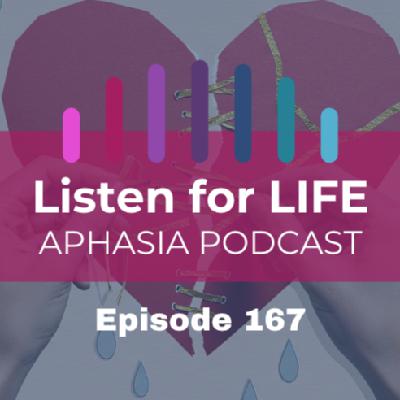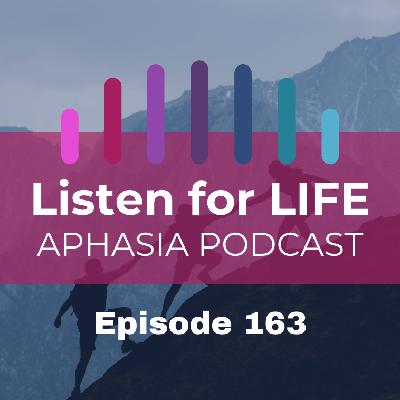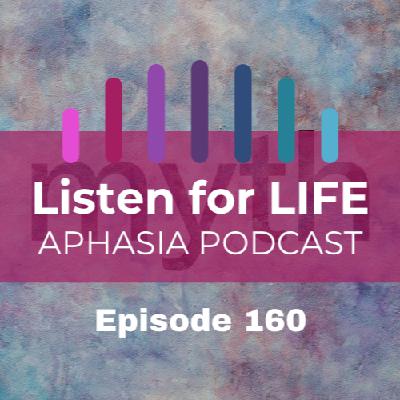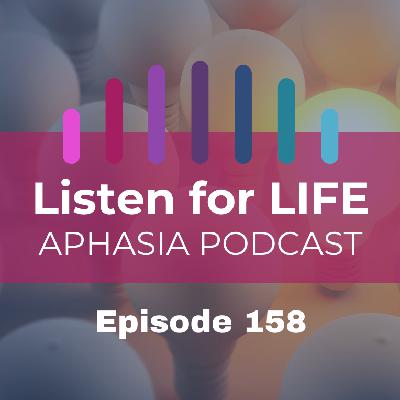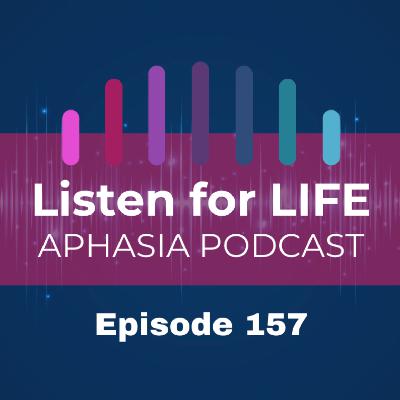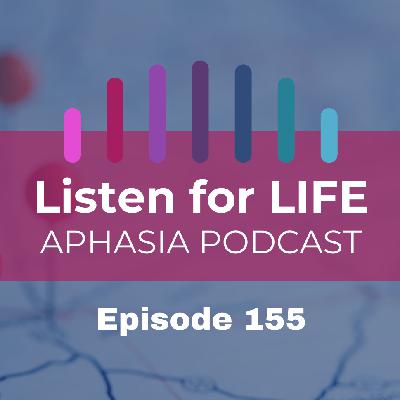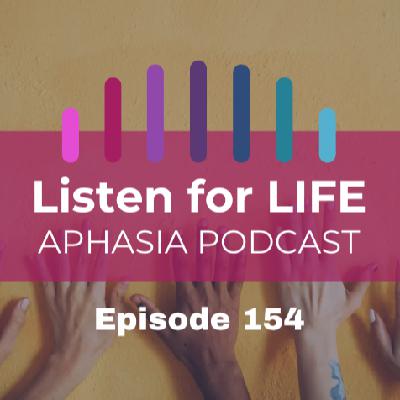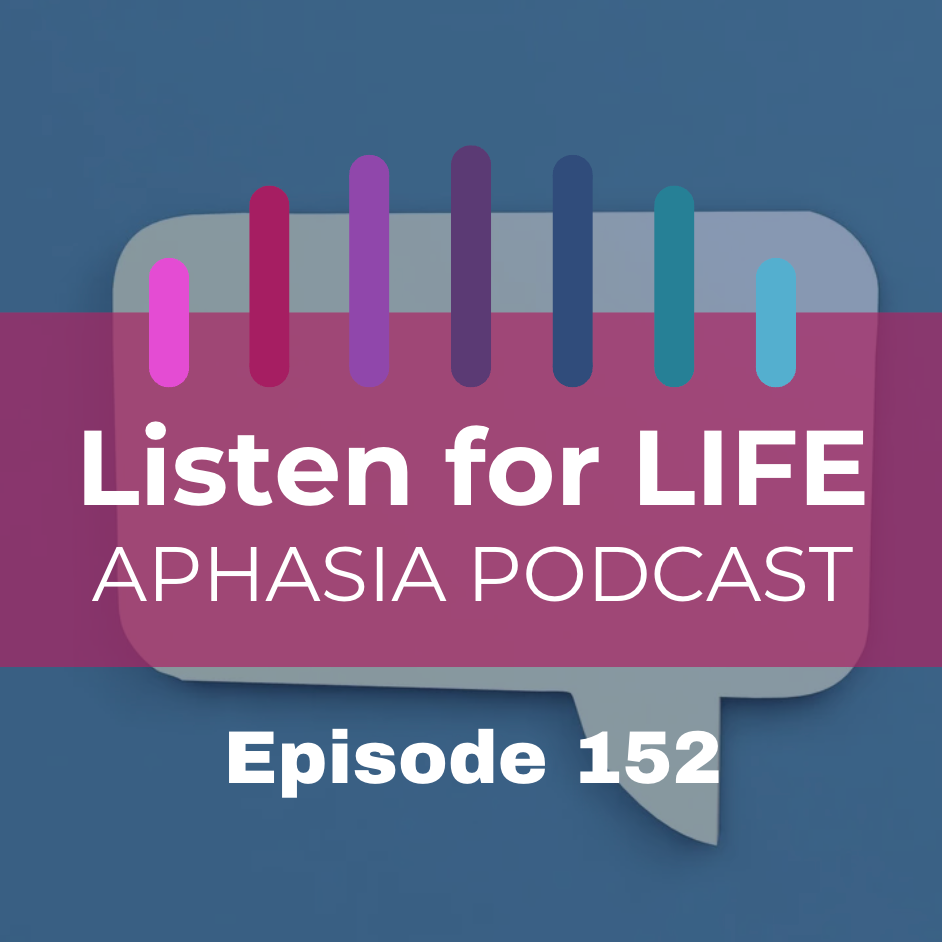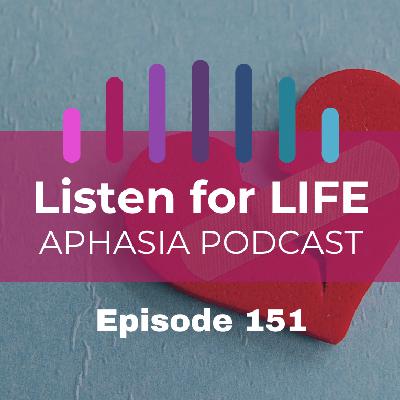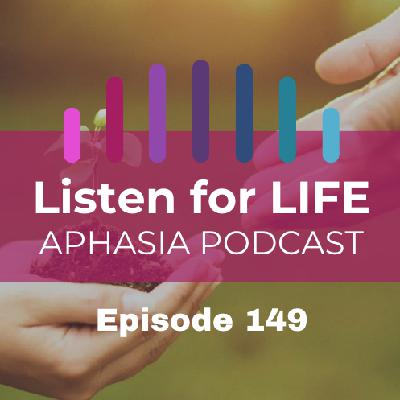Discover LIFE Beyond Aphasia
LIFE Beyond Aphasia

LIFE Beyond Aphasia
Author: LIFE Aphasia Academy® Genevieve Richardson
Subscribed: 8Played: 219Subscribe
Share
© Copyright 2024 LIFE Speech Pathology + Aphasia Academy® All rights reserved.
Description
Welcome to the Listen for LIFE Aphasia Podcast, where you’re among friends who understand the journey of aphasia. If the word ’aphasia’ is familiar, then you’re in the right place. Join us as we embark on a journey filled with knowledge, inspiration, invaluable resources, and unwavering support.
Feeling isolated or overwhelmed by the day-to-day challenges? You’re not alone. The Listen for LIFE Aphasia podcast is your sanctuary, designed to uplift and empower you through every step of your journey. Through insightful conversations and uplifting stories, we’ll provide the guidance and encouragement you need to embrace life to its fullest.
In life, they say it takes a village. Consider this podcast your village—a place where understanding, compassion, and empowerment converge. Together, we’ll navigate the twists and turns, celebrating triumphs and overcoming obstacles because here, your journey is our journey.
Welcome home—to the Listen for LIFE Aphasia Podcast, where every voice matters.
Feeling isolated or overwhelmed by the day-to-day challenges? You’re not alone. The Listen for LIFE Aphasia podcast is your sanctuary, designed to uplift and empower you through every step of your journey. Through insightful conversations and uplifting stories, we’ll provide the guidance and encouragement you need to embrace life to its fullest.
In life, they say it takes a village. Consider this podcast your village—a place where understanding, compassion, and empowerment converge. Together, we’ll navigate the twists and turns, celebrating triumphs and overcoming obstacles because here, your journey is our journey.
Welcome home—to the Listen for LIFE Aphasia Podcast, where every voice matters.
170 Episodes
Reverse
“He was sent home after only 20 days of therapy. No roadmap. No plan. Just silence.”
For many stroke survivors, that silence turns into helplessness. But for Eric Jackson, it sparked something else. In this conversation, Eric shares how he rebuilt his life after aphasia—returning to work, finding his own speech strategies, and eventually stepping into advocacy and research. This is aphasia recovery that refuses to stop at survival.
Key takeaways:
• Why helplessness creeps in when therapy ends too soon
• The moment Eric realized he could shape his own aphasia recovery
• How to return to work after stroke by redefining success
• Simple speech strategies to slow down and preserve energy
• Why advocacy and research can be part of healing, not just giving back
If you’re ready to reclaim your voice in this journey, here’s your next step: 👉 Take It Back: The Aphasia Advocacy Guide. What stroke stole, you can take back. This short, powerful PDF shows you how to speak up for your rights, your partner, and your future after aphasia.
https://www.lifeaphasiaacademy.co/take-it-back
More Resources:
LIFE Speech Pathology®: https://www.lifespeechpathology.com
LIFE Aphasia Academy®: https://www.lifeaphasiaacademy.com
Aphasia Phil’s YouTube Channel: https://www.youtube.com/@AphasiaP/videos
Aphasia Research Resources: https://docs.google.com/document/d/1oG88tvDTDbFiHdJPL7S7n5syAau4yXjkNC0j-vmZ_1c/edit?tab=t.0
You’re not failing. You’re adapting.
Drop a comment if this feels like your story—I read every one.
When stroke changes who you are and how you see yourself, recovery can’t stop at the physical.
This episode explores how rebuilding identity together brings back meaning, purpose, and connection.
Work with us.
After stroke and aphasia, most families are told how to recover skills—not how to rebuild a life.
In this conversation, Genevieve talks with Debra Meyerson and Steve Zuckerman, co-founders of Stroke Onward and authors of Identity Theft: Rediscovering Ourselves After Stroke and Aphasia.
They share the story behind their book, their marriage, and their mission to help survivors and care partners rediscover who they are after everything changes. You’ll learn how identity work becomes the bridge between recovery and living well again.
You’ll take away:
• Why identity loss is often the hardest part of stroke recovery
• How small, shared routines help rebuild confidence and belonging
• What it means to move from “getting better” to “becoming whole”
For care partners and families rebuilding life after stroke:
https://www.lifeaphasiaacademy.co/life-aphasia-collective
https://strokeonward.org/
https://strokeonward.org/identity-theft-book/
https://circle.strokeonward.org/c/welcome
https://strokeonward.org/gathering/
https://www.pbs.org/video/stroke-across-america-trauma-adaptation-purpose-oukojg/
https://secure.qgiv.com/for/strokeonward/event/scopmbcc-rao22c/
https://strokeonward.org/community/
“I don’t always do this in public, because it’s exhausting—but I can, if you give me a minute.”
If you've ever filled in the blank, answered for your partner, or just wanted to make life easier—you’re not alone. But there’s a hidden cost to helping too much. And for survivors with aphasia, that cost is steep: they start to believe they can’t.
This episode is about the quiet way learned helplessness takes root in stroke recovery—and how we, as care partners and survivors, can stop reinforcing it without realizing. It’s not about blame. It’s about patterns. And the good news? Patterns can change.
What learned helplessness really is—and how it quietly rewires a survivor’s brain
• How care partners accidentally reinforce it (and how to stop)
• Matt’s story: what happened when he paused, explained, and spoke up for himself
• Why other people’s discomfort can make recovery harder
• A simple mindset shift to help survivors reclaim dignity and participation
Survivor, do you want to take your life back? There’s a guide I want you to have.
TAKE IT BACK: A Survivor’s Guide to Reclaiming Strength, Dignity, and Confidence After Stroke
https://lifeaphasiaacademy.co/f/take-it-back
Two aphasia caregivers take two different paths. Are you Lisa or Elena?
https://lifeaphasiaacademy.co/lisa-or-elena
Feel stuck in your recovery? This guide will remind you why progress is still possible:
3 Keys to LIFE Beyond Aphasia
https://www.lifeaphasiaacademy.co/3-keys
Aphasia spouses and caregivers, we have resources for you.
https://lifeaphasiaacademy.co/care-partner-resources
Explore speech pathology communication coaching options:
https://www.dolifespeechpathology.com/treatment-for-aphasia-and-neurologic-conditions
Learn more about our private support community for aphasia care partners:
https://www.lifeaphasiaacademy.co/life-aphasia-collective
Subscribe for new YouTube episodes:
https://www.youtube.com/@LIFESpeechPathology/videos
Listen to Listen for LIFE Aphasia podcast on Apple Podcasts:
https://podcasts.apple.com/us/podcast/listen-for-life-aphasia-podcast/id1621948384
Start small. Start here. Start with you.
“He used to try... and now he just sits there.”
Maybe you've said those words to yourself—or out loud to a friend. It’s one of the hardest parts of life after stroke, especially with aphasia. You're watching someone you love shrink. They used to fight. They used to care. Now they won’t even try. But what if what looks like apathy is actually something else?
This episode unpacks a hidden truth: most stroke survivors haven’t given up. They’re just surviving. They’re stuck in the moment, unable to see how today’s effort connects to anything that still matters. Especially with aphasia, there’s no clear line between the task and the “why.” That’s where learned helplessness sneaks in. And that’s why your role as a care partner becomes so important—not to force effort, but to rebuild relevance.
Key Takeaways:
What learned helplessness really is—and why it’s not laziness
• Why survivors need us to draw the connection between “effort” and “outcome”
• How trauma and disorientation hide behind silence or compliance
• The power of identity, relevance, and one person who believes in you
• A better way to respond when you feel stuck, tired, or unheard
If this hits home—there’s a guide I want you to have.
TAKE IT BACK: A Survivor’s Guide to Reclaiming Strength, Dignity, and Confidence After Stroke
More Resources:
Two aphasia caregivers and two different paths. Are you Lisa or Elena? https://lifeaphasiaacademy.co/lisa-or-elena
Feel stuck in your recovery? This guide will remind you why progress is still possible: 3 Keys to LIFE Beyond Aphasia
Aphasia spouses and caregivers, we have resources for you. https://lifeaphasiaacademy.co/care-partner-resources
Explore speech pathology communication coaching options: https://www.dolifespeechpathology.com/treatment-for-aphasia-and-neurologic-conditions
Join our private support community for aphasia care partners: LIFE Aphasia Collective
Subscribe for new YouTube episodes: https://www.youtube.com/@LIFESpeechPathology/videos
Listen to Listen for LIFE Aphasia podcast on Apple Podcasts: https://podcasts.apple.com/us/podcast/listen-for-life-aphasia-podcast/id1621948384
🌱 You’re not failing. You’re adapting.
“He remembers every detail when talking to strangers, but with me—it feels like we’re speaking different languages.”
That’s the silent frustration so many couples face after aphasia. It’s not that you don’t care or aren’t trying—it’s that the same old ways of talking don’t work anymore. Better Conversations for Aphasia helps you spot the hidden barriers and find the small facilitators that change everything.
Why does this matter? Because winging it leads to missed communication and hurt feelings. Barriers like interruptions, timing, and distractions keep you stuck. But even one facilitator—a note, a pause, a quiet space—can shift the whole interaction. I’ll share real stories of couples who found freedom in small, intentional changes.
If this hit home—there’s a guide I want you to have.
https://care-partner-compass.lovable.app/
You’re not failing. You’re adapting.
“I thought I was helping. Turns out, I was shutting him down.”
If that feels familiar—you’re not alone. Most care partners want to support, but the way we “help” can end up adding pressure instead of relief. In this episode, I share three evidence-based moves from Supported Conversation for Adults with Aphasia (SCA™) that cut through frustration and bring conversations back to connection. You’ll also hear Joey’s story—how he turned nightly dinner battles into a bridge for closeness.
These strategies aren’t about saying more. They’re about slowing down, supporting what’s already there, and making sure you both feel heard. And when practiced together, they rebuild trust that aphasia often erodes.
Key Takeaways
• Why common “helping” behaviors backfire and increase frustration
• The 3 conversation moves that build trust instead of tension • Joey’s story: how one dinner-table shift changed everything
• Why you need all three moves together—not just one at a time
• How to pick one recurring “big rock” or “little rock” situation to start practicing
If this hits home—there’s a guide I want you to have.https://care-partner-compass.lovable.app/
More Resources:
Speak up for yourself after stroke—Take It Back: https://lifeaphasiaacademy.co/f/take-it-back
Feel stuck? This will remind you why progress is still possible: https://dolifespeechpathology.com/f/neuroplasticity
Care partner resources: https://lifeaphasiaacademy.co/care-partner-resources
Explore therapy options: https://dolifespeechpathology.com
Subscribe for new episodes: https://www.youtube.com/@LIFESpeechPathology/videos
Listen on Apple Podcasts: https://podcasts.apple.com/us/podcast/listen-for-life-aphasia-podcast/id1621948384
Start small. Start here. Start with you.
“He sat in the meeting with more experience than anyone else in the room—yet he stayed silent and let others speak for him.”
That silence didn’t just happen at work. It followed Kevin home, where the shame and frustration of aphasia turned his marriage into a roommate arrangement. He had done every worksheet, every drill, and still asked himself: “Is this it for me?”
If you’ve ever wondered the same, Kevin’s story will remind you: recovery doesn’t stop when therapy ends. Neuroplasticity—the brain’s ability to rewire—doesn’t expire at six months or a year. But it only comes alive when belief meets structure.
Key takeaways:
• The hidden difference between spontaneous recovery and dependent recovery
• Why worksheets can improve skills in therapy but not real life
• How belief acts as the ignition for neuroplasticity
• The small repeatable frameworks Kevin used to rebuild work, marriage, and identity
• Why it’s never “too late” to start again
Kevin learned the hard way that therapy progress doesn’t always carry over into real life. That’s why I put together a free guide called 3 Keys to Life Beyond Aphasia. It’s not another worksheet list. It’s the exact steps that helped Kevin bring progress home — into work, into marriage, into everyday life. If you’ve ever wondered how to bridge that gap, this guide is for you.
Grab your copy of 3 Keys to LIFE Beyond Aphasia https://www.lifeaphasiaacademy.co/3-key-reasons-aphasia-progress-never-stops
She looked angry. He pulled back. Later, he realized—it wasn’t anger at all. It was aphasia.
If you’ve ever replayed a hard moment thinking, “I should’ve been more patient, I should know what to say by now”—this episode is for you. The guilt spiral is real. But what if the story you’re telling yourself isn’t the real one?
Why guilt and self-blame show up so quickly in caregiving
The hidden difference between acting as “the judge” vs. “the detective”
How the ACE filter (Aphasia, Cognition, Emotion) changes everything
Why understanding your partner’s aphasia and cognition is essential to breaking free of the spiral
A gentle reframe: mistakes aren’t failures—they’re clues
If this hits home, take the free Care Partner Compass. It shows you where you are right now and points to what can actually make communication and connection feel lighter.
https://lifeaphasiaacademy.co/f/care-partner-compass
More Resources:
“Are you Lisa or Elena? https://lifeaphasiaacademy.co/f/lisa-or-elena”
“Speak up for yourself after stroke—Take It Back: https://lifeaphasiaacademy.co/f/take-it-back”
“Feel stuck? This will remind you why progress is still possible: https://dolifespeechpathology.com/f/neuroplasticity”
“Care partner resources: https://lifeaphasiaacademy.co/care-partner-resources”
“Explore therapy options: https://dolifespeechpathology.com”
“Join our private support community: https://dolifespeechpathology.co/collective”
“Subscribe for new episodes: https://www.youtube.com/@LIFESpeechPathology/videos”
“Listen on Apple Podcasts: https://podcasts.apple.com/us/podcast/listen-for-life-aphasia-podcast/id1621948384”
You’re not failing. You’re learning the new rules.
He asked what’s for dinner. She saw his blank stare, thought he was angry, and pulled away. But it wasn’t anger at all.
We don’t talk about this enough—the way aphasia and stroke can twist how care partners interpret every look, every sigh, every silence. You end up carrying blame that was never yours. That’s why I teach the ACE Filter: Aphasia, Cognition, Emotion. It’s a way to stop, pause, and ask what’s really happening before you react.
Here’s what you’ll learn in this episode:
• Why misreading “Resting B-Face” is one of the most painful hidden traps for care partners
• How the ACE Filter (Aphasia, Cognition, Emotion) helps you play detective instead of taking it personally
• The Facebook myth I see over and over: “They’re always angry at me”
• A simple way to shift from blame to clarity in the hardest everyday moments
If this landed for you, try the Care Partner Compass. It’s free, it gives you clarity about your strengths and struggles, and it helps you see where to focus for better connection. The link’s below.
More Resources:
Care Partner Compass: https://care-partner-strength-wheel.lovable.app/
Speak up for yourself after stroke—Take It Back: https://lifeaphasiaacademy.co/f/take-it-back
Feel stuck? This will remind you why progress is still possible: https://dolifespeechpathology.com/f/neuroplasticity
Explore therapy options: https://dolifespeechpathology.com
Join our private support community: https://dolifespeechpathology.co/collective
Subscribe for new episodes: https://www.youtube.com/@LIFESpeechPathology/videos
Listen on Apple Podcasts: https://podcasts.apple.com/us/podcast/listen-for-life-aphasia-podcast/id1621948384
Start small. Start here. Start with you.
The hardest thing Oscar ever did as a brother was sit in silence and wait. Three seconds felt like forever.
When you love someone with aphasia, silence can feel heavy, awkward, even unbearable. You want to jump in, help, finish the word. But what if the greatest act of love is actually the pause?
In this episode, we unpack the Kitchen Timer Experiment—the “weirdest” aphasia strategy that works. You’ll see why waiting just three seconds before stepping in can change everything about how you connect with your loved one.
Key Takeaways:
• Why interrupting can derail the whole process of finding a word
• How the brain works behind the scenes just to name a simple object
• The gas tank analogy: why energy drains faster than you think
• The 3-second pause as an act of love, not abandonment
• A small shift that can protect dignity, trust, and closeness
If this hits home—you’ll want to try the Care Partner Compass. It’s free, simple, and shows you where your caregiving strengths are and where you could use support. From there, you can join the waitlist for the Collective, where we practice these strategies together. The links are below.
More Resources:
Care Partner Compass: https://care-partner-strength-wheel.lovable.app/
Speak up for yourself after stroke—Take It Back: https://lifeaphasiaacademy.co/f/take-it-back
Feel stuck? This will remind you why progress is still possible: https://dolifespeechpathology.com/f/neuroplasticity
Explore therapy options: https://dolifespeechpathology.com
Join our private support community: https://dolifespeechpathology.co/collective
Subscribe for new episodes: https://www.youtube.com/@LIFESpeechPathology/videos
Listen on Apple Podcasts: https://podcasts.apple.com/us/podcast/listen-for-life-aphasia-podcast/id1621948384
Start small. Start here. Start with you.
“They handed me a discharge packet. Not a manual.”
You’re the care partner. The advocate. The one who shows up. But the truth is—no one trained you for this. You’ve been expected to manage appointments, medications, your partner’s moods and words and losses… all while trying to keep the groceries stocked and the lights on.
And the hardest part? You’re doing it with love. But you’re also doing it without a roadmap.
In this episode, Genevieve joins Aphasia Phil to talk about what every stroke and aphasia care partner wishes they’d been told from day one: how to actually help, without drowning in guilt, exhaustion, or fear. If you’ve ever thought, “I’m doing everything I can, but I still feel like I’m failing,”—this conversation is for you.
What to do when people say, “Let me know if you need anything”—and you freeze
• Why care partners feel invisible, even when surrounded by people
• The single most important role you’re playing—and why no one acknowledges it
• How How to Help was created to finally give care partners a guide that doesn’t sugarcoat the emotional weight
• What changes when your partner starts healing—and you’re still stuck in survival mode
If any part of this felt too real… there’s a free 5-day reset I want you to have.
It’s called From Chaos to Clarity—and it’s just for care partners.
https://dolifespeechpathology.com/f/from-chaos-to-clarity-email-course
More Resources:
Are you Lisa or Elena? https://lifeaphasiaacademy.co/f/lisa-or-elena
Speak up for yourself after stroke—Take It Back: https://lifeaphasiaacademy.co/f/take-it-back
Feel stuck? This will remind you why progress is still possible: https://dolifespeechpathology.com/f/neuroplasticity
Care partner resources: https://lifeaphasiaacademy.co/care-partner-resources
Explore therapy options: https://dolifespeechpathology.com
Join our private support community: https://dolifespeechpathology.co/collective
Subscribe for new episodes: https://www.youtube.com/@LIFESpeechPathology/videos
Listen on Apple Podcasts: https://podcasts.apple.com/us/podcast/listen-for-life-aphasia-podcast/id1621948384
Start small. Start here. Start with you.
Maura Silverman, Executive Director of the National Aphasia Association, advocates for individuals with aphasia and their families, emphasizing the need for increased awareness and community education. The discussion highlights the isolation faced by those with aphasia and the importance of building meaningful relationships, as well as the NAA's role in providing resources and support. With initiatives like the "Listen for Life Aphasia" podcast and monthly "Ask the Expert" sessions, the NAA aims to educate families on communication strategies and enhance community connections, ultimately focusing on preserving identity and family roles for those affected.
Speak up for yourself after stroke—Take It Back: https://lifeaphasiaacademy.co/f/take-it-back
Are you Lisa or Elena? https://lifeaphasiaacademy.co/f/lisa-or-elena
Feel stuck? This will remind you why progress is still possible: https://dolifespeechpathology.com/f/neuroplasticity
Care partner resources: https://lifeaphasiaacademy.co/care-partner-resources
Explore therapy options: https://dolifespeechpathology.com
Join our private support community: https://dolifespeechpathology.co/collective
Subscribe for new episodes: https://www.youtube.com/@LIFESpeechPathology/videos
Listen on Apple Podcasts: https://podcasts.apple.com/us/podcast/listen-for-life-aphasia-podcast/id1621948384
Are you caring for someone with aphasia? In this episode, Genevieve Richardson, a speech pathologist and care partner coach, busts the 7 most common myths that can hold caregivers and spouses back—and shares one practical tip for each.
You’ll learn:
• How to set boundaries without guilt
• The truth about “procrastination” and what it really means
• Why self-care isn’t selfish
• How routines give you freedom
• What aphasia does (and doesn’t) mean for intelligence
• What’s really behind “difficult behaviors”
• Why recovery doesn’t have an expiration date
Get expert advice, actionable tools, and real-world encouragement in less than 20 minutes. Want to dive deeper or connect with other care partners? Join our private membership, The Collective, for community, workshops, and step-by-step support.
Which myth surprised you most? Let us know in the comments!
#Aphasia #CarePartner #CaregiverSupport #MythBusting #SpeechTherapy #StrokeRecovery
Are you an aphasia care partner feeling lost, overwhelmed, or like you're navigating this journey without a map? This YouTube episode is for you. In this powerful live event replay, we dive deep into the often-unseen struggles of care partners and reveal a revolutionary pathway to thriving beyond aphasia and stroke.
Discover the crucial epiphany: recovery is truly maximized when the care partner is taken care of. For too long, caregivers have been the unseen heroes, without a dedicated roadmap for their unique challenges. We explore the emotional toll – the grief, coping, constant worry, and fear of doing something wrong – that traditional rehab often overlooks.
Learn how Life Aphasia has developed a pathway forward for care partners, offering actual tools, training, and steps forward that are complimentary to survivor rehab.
In this video, you'll see a live demonstration of:
Our Care Partner Compass: A free, self-reflection tool to help you gain clarity on your daily structure, support, understanding of aphasia/cognition, connection, personal time, and purpose.
How the Compass points to our Roadmap: A structured, nine-step process designed to eliminate guesswork and decision fatigue, providing bite-sized, actionable steps.
Hear the inspiring, tangible transformation of D, a care partner who, after years, used this roadmap to find connection and even share a toast at her daughter's wedding – a moment she never thought possible. Her journey proves that aphasia and stroke do not have to rule every minute of your existence.
This Aphasia Care Partner Independence Month, we're making inroads to ensure care partners are supported so they can better support their survivors. We believe there is a life beyond aphasia, and we have the map to prove it.
If you're looking for structure, coaching, and a private community that meets you where you are, The Collective membership offers exactly that. It's month-to-month, designed to support you every step of the way.
Important: The doors for The Collective are open through the end of July, and we don't know when they'll open again. Don't miss this opportunity to gain control, clarity, and connection.
Watch the full replay to see the Compass in action and learn more about your path to thriving.
Get your free Care Partner Compass here: https://care-partner-strength-wheel.lovable.app/
Ready to join our private community, The Collective, and start your roadmap to a fuller life? https://lifeaphasiaacademy.co/f/life-aphasia-collective
We dive into the challenges faced by individuals with aphasia and their care partners and the crucial role that community support plays in navigating aphasia care. Here's a comprehensive summary of what you can expect:
We start by sharing the inspiring story of Betty, a retired store manager whose husband experienced a stroke and now lives with aphasia. Betty initially felt overwhelmed and hesitant to accept help, but we explored how she overcame her concerns and found support.
One key takeaway is respecting the wishes of individuals with aphasia. We discuss how forcing assistance upon them can be counterproductive, and instead, we should focus on maintaining open lines of communication and staying connected.
We also explore practical actions that can make a difference. Coordinating volunteers to help with errands and household tasks can alleviate some of the burden on care partners while providing meals and household assistance ensures proper nutrition and reduces stress.
Loneliness and isolation are common challenges for individuals with aphasia and their caregivers, so offering companionship is incredibly valuable. We discuss the positive impact of having someone to talk to and spend time with.
Transportation to therapy sessions is another crucial aspect of aphasia care. Many individuals with aphasia struggle with transportation due to communication difficulties, so offering assistance in this area can significantly enhance their access to necessary treatment.
Lastly, we emphasize the importance of continued support even after the initial crisis has passed. Aphasia is a long-term condition, and ongoing assistance can significantly improve the quality of life for individuals with aphasia and their caregivers.
Remember, LIFE Speech Pathology is here to help, so let's join together to create a supportive community for those affected by aphasia. Thank you for your support and engagement with LIFE Speech Pathology®.
Explore our services and approach at Do LIFE Speech Pathology . Listen to our Listen for LIFE Aphasia Podcast for more resources and inspiring stories. Stay connected with us on YouTube , Facebook , and Instagram for updates and encouragement. Together, let's uncomplicate aphasia.
What if the reason you feel overwhelmed isn’t because you’re doing it wrong—but because no one ever showed you how to structure your day?
In this episode, Genevieve shares a training from inside the LIFE Aphasia Collective®—a private membership group for stroke and aphasia care partners—focused on the one tool that changes everything: frameworks.
Care partners like Teresa are carrying it all: schedules, therapy, communication, emotions… but they weren’t given a manual. A simple framework gives them back clarity, structure, and the confidence to say no without guilt. If you're tired of reacting all day long, this is your starting point.
Whether you're new to caregiving or deep in it, this episode is a lifeline.
🌀 Ready to take the first step?
Use the Care Partner Strengths Wheel (free, 5 minutes):
https://www.dolifespeechpathology.com/wheel
In this episode of the Listen for LIFE Aphasia podcast, we dive into the world of caregiving for individuals with communication with Dr. Kristin Schaffer Mendez. Dr. Kristin Schaffer Mendez, PhD, CCC-SLP, is a speech-language pathologist and an assistant professor at the University of St. Augustine in Austin, TX. Her primary areas of focus are in adult neurogenic communication disorders and counseling. Kristin researches holistic treatment approaches and lived experiences of people with aphasia/PPA and their care partners. She shares her expertise and insights on providing support for patients, families, and caregivers.
To uncomplicate aphasia and enhance the well-being of both patients and caregivers, Kristin encourages establishing a strong therapeutic relationship with patients and their families. By doing so, treatment outcomes can be improved, and overall well-being can be enhanced.
Remember, taking care of yourself is just as important as taking care of your loved ones. If you want to learn more about LIFE Speech Pathology and their resources, be sure to check out their website and social media channels.
Take action today and prioritize your well-being as a caregiver. You're doing an incredible job, and we're here to support you every step of the way.
If you want more information regarding Kristin's research, or if you have any questions for her, please email her at kmendez@usa.edu!
The Listen for LIFE Aphasia Podcast is a platform dedicated to supporting individuals through stories and experiences. Visit ListenForLIFEAphasiaPodcast.com to view video episodes. If you have a topic or guest recommendation, or if YOU want to be a guest, visit the Guest Hub. If you have any unanswered questions, you can ask Genevieve and Aphasia Wisdom through “Search for Answers.”
If you or a loved one is seeking telepractice support, LIFE Speech Pathology® can help! Explore our services and approach at DoLIFESpeechPathology.com.
Stay connected with us on YouTube, Facebook, and Instagram for updates and encouragement.
Together, let's uncomplicate aphasia.
“I wasn’t lazy. I was lost.”
If that line hits too close to home, this conversation is for you.
After stroke or aphasia, it’s easy to believe you’re just not trying hard enough. That you should feel more motivated. But what if it’s not a lack of willpower? What if the real issue is apathy, grief, or a recovery mindset that no longer fits?
This episode with Aaron Avila (Stroke TV Media) is honest, grounded, and deeply needed. We talk about what it means to rebuild when motivation feels gone—and why the “try harder” advice survivors often get isn’t just unhelpful. It can actually backfire.
Why stroke survivors feel stuck—even when they want to move forward
• The difference between apathy and depression (and why it matters)
• How purpose—not willpower—actually fuels motivation
• The mindset shift that helped Aaron take back his life
• One small way to start rebuilding today
If this episode hit home—there’s a guide I want you to have.
https://dolifespeechpathology.com/f/take-it-back-phrasebook
More Resources:
Speak up for yourself after stroke—Take It Back: https://lifeaphasiaacademy.co/f/take-it-back
Are you Lisa or Elena? https://lifeaphasiaacademy.co/f/lisa-or-elena
Feel stuck? This will remind you why progress is still possible: https://dolifespeechpathology.com/f/neuroplasticity
Care partner resources: https://lifeaphasiaacademy.co/care-partner-resources
Explore therapy options: https://dolifespeechpathology.com
Join our private support community: https://dolifespeechpathology.co/collective
Subscribe for new episodes: https://www.youtube.com/@LIFESpeechPathology/videos
Listen on Apple Podcasts: https://podcasts.apple.com/us/podcast/listen-for-life-aphasia-podcast/id1621948384
Start small. Start here. Start with you.
He looked down and said, “I don’t even know how to talk to her anymore.”
That moment didn’t happen in the hospital.
It happened at home—months after stroke rehab ended.
When the support disappeared, and recovery got… quiet.
If you’ve ever felt like the plan vanished after discharge, like you're carrying something no one prepared you for—this episode is for you.
We’re naming the therapy shift no one explains. And we’re breaking down what actually helps after stroke… and what leaves families stuck.
💡 Key Takeaways:
What “the therapy shift” really means—and why it catches families off guard
How to know if therapy is working (and when it’s not)
What care partners should be included in—but often aren’t
What to look for in a therapist who truly gets aphasia
A short, powerful story that might sound like your own
If this episode hit home—
For the stroke survivor:
You might be wondering, “How do I take back control of my recovery?”
We created the Take It Back guide to help you do exactly that—with tools and insights that center your identity, voice, and goals.
👉 https://lifeaphasiaacademy.co/f/take-it-back
And if you’re a care partner:
You’re holding so much—being protective, being the cheerleader, managing all the new responsibilities.
This role doesn’t come with a manual—but this tool is a powerful first step to getting control.
The Care Partner Self-Reflection Wheel helps you see where you’re strong—and where you might need more support.
It’s not about judgment. It’s about visibility.
👉 https://lifeaphasiaacademy.co/f/care-partner-strengths-wheel
More Resources:
LIFE Aphasia Collective® Community:
https://dolifespeechpathology.co/collective
3 Reasons Aphasia Progress Never Stops:
https://dolifespeechpathology.com/f/neuroplasticity
Care Partner Resources:
https://lifeaphasiaacademy.co/care-partner-resources
LIFE Speech Pathology® Services:
https://dolifespeechpathology.com
YouTube Channel (More Episodes):
https://www.youtube.com/@LIFESpeechPathology/videos
Listen for LIFE Aphasia Podcast:
https://podcasts.apple.com/us/podcast/listen-for-life-aphasia-podcast/id1621948384
You’re not doing this wrong. You’re doing something no one prepared you for.
And you’re not doing it alone anymore.
Why Speaking Up After Stroke Feels So Hard
If you’ve ever left a doctor’s office thinking, “I should’ve said something”—you’re not alone.
This episode breaks down why communication after stroke feels so difficult—and what you can do about it.
Understand how executive dysfunction and aphasia fatigue make speaking up harder than it seems
Learn why care partners sometimes hurt more than help (even when they mean well)
Discover one small phrase you can prepare to take your power back this week
Start reclaiming what stroke tried to steal—your voice, identity, and confidence.
🎯 Download the free guide: https://lifeaphasiaacademy.co/f/take-it-back


